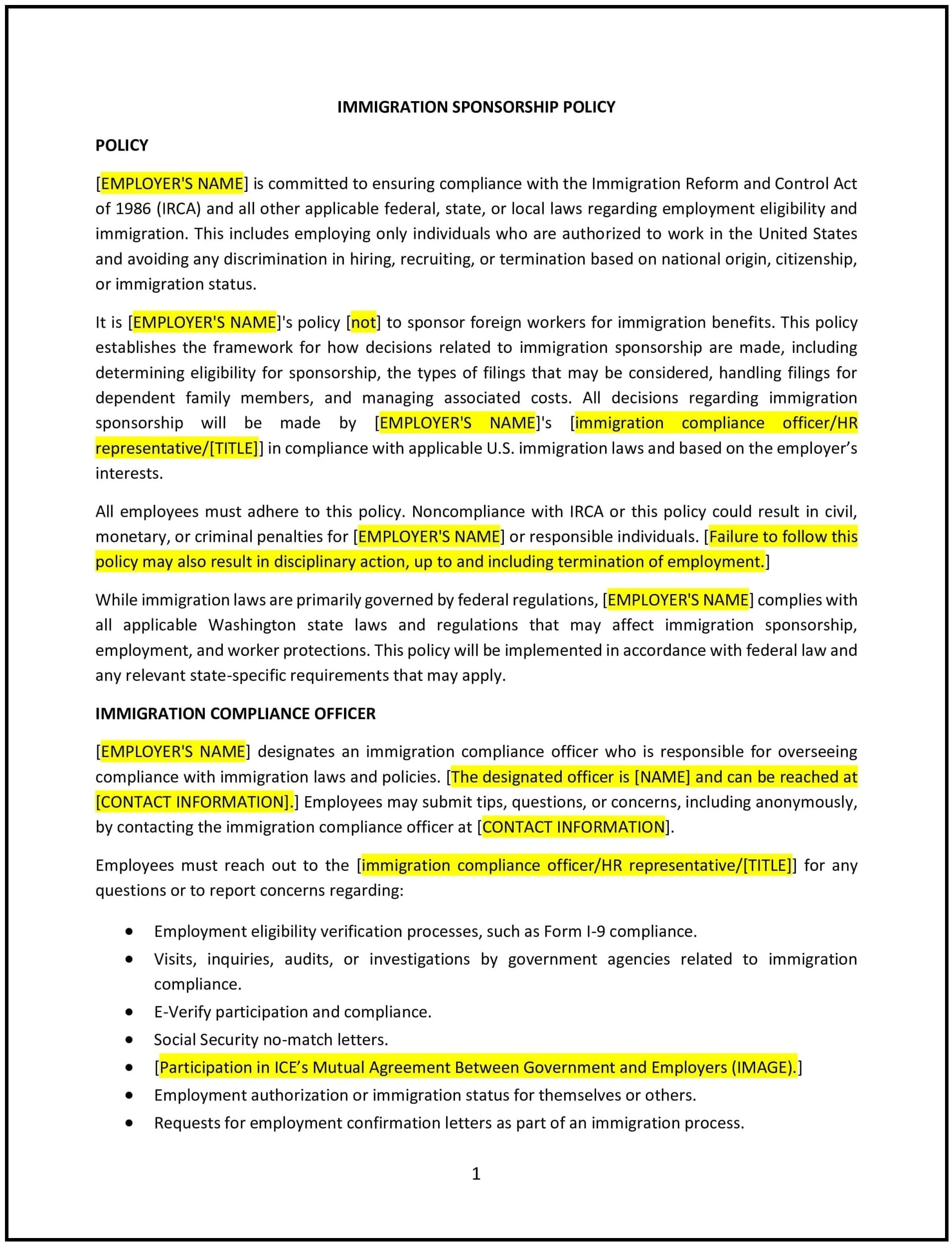Immigration sponsorship letter (Washington): Free template
Got contracts to review? While you're here for policies, let Cobrief make contract review effortless—start your free review now.

Customize this template for free
This immigration sponsorship letter is designed to help Washington businesses provide sponsorship for employees seeking work visas or permanent residency in the United States. The letter serves as an official communication from the employer to U.S. immigration authorities, affirming the company's support for the employee's visa or green card application. It includes details about the employee’s position, qualifications, and the company’s commitment to supporting the employee's immigration process.
By adopting this policy, businesses can assist qualified employees in navigating the U.S. immigration system, foster talent retention, and demonstrate support for a diverse workforce.
How to use this immigration sponsorship letter (Washington)
- Define eligibility for sponsorship: The policy should clarify the types of positions and employees that are eligible for sponsorship. This may include specifying that sponsorship is available only for certain job categories, levels, or employees with specialized skills that are critical to the company’s operations.
- Identify required documentation: Specify the documents needed to process the sponsorship, such as proof of employment, the employee’s qualifications, job description, and any other documentation required by U.S. Citizenship and Immigration Services (USCIS). The company should ensure all necessary documents are prepared before submitting the sponsorship letter.
- Outline the sponsorship process: Provide clear instructions on how the immigration sponsorship process works within the company, including the timeline, key steps, and any specific procedures for obtaining and submitting the sponsorship letter.
- Ensure compliance with U.S. immigration laws: The policy should ensure that the company complies with all relevant immigration laws and regulations, including the Immigration and Nationality Act (INA), U.S. Department of Labor (DOL) requirements, and any applicable Washington state regulations related to employment and immigration.
- Address employee responsibilities: The policy should also clarify the employee’s role in the process, including any steps they must take to complete their immigration applications or maintain their status. Employees should be informed about their responsibilities and timelines.
- Define support for the application process: Outline how the company will support the employee throughout the application process, including filing paperwork, paying application fees, and working with legal counsel or immigration experts to ensure a smooth process.
- Include a clear sponsorship letter format: Provide a standardized template for the immigration sponsorship letter, making it clear what information needs to be included, such as the employee's name, job title, job description, and salary. Ensure that the letter meets the requirements of USCIS and other relevant immigration authorities.
- Review and update regularly: Periodically review and update the policy to ensure it remains compliant with changes in U.S. immigration laws, federal regulations, or company practices.
Benefits of using this immigration sponsorship letter (Washington)
This policy offers several benefits for Washington businesses:
- Attracts and retains top talent: Offering immigration sponsorship helps attract highly skilled employees from around the world, enabling businesses to fill specialized roles and build a diverse workforce.
- Promotes diversity and inclusion: The policy helps businesses support a diverse workforce by assisting employees in obtaining legal authorization to work in the U.S., promoting an inclusive work environment.
- Reduces turnover: By sponsoring employees for permanent residency, businesses can improve employee retention and loyalty, reducing turnover and the associated costs of hiring and training new staff.
- Supports business growth: Access to a global talent pool enables businesses to expand their workforce and remain competitive in an increasingly globalized market.
- Complies with immigration laws: The policy helps businesses comply with U.S. immigration laws and regulations, reducing the risk of penalties or legal challenges related to employee immigration status.
- Enhances company reputation: Companies that support employees' immigration processes are seen as ethical and responsible employers, improving their reputation with both current employees and potential candidates.
Tips for using this immigration sponsorship letter (Washington)
- Communicate the policy clearly: Ensure that employees understand the company’s immigration sponsorship policy and the criteria for eligibility. Include the policy in the employee handbook and review it during onboarding. Provide periodic reminders and updates.
- Provide guidance for employees: Make sure employees understand their responsibilities during the immigration sponsorship process. Offer support, including access to legal or immigration experts who can help with paperwork or procedures.
- Use a consistent and standardized process: Ensure that the immigration sponsorship process is consistent for all employees who meet the eligibility criteria. This ensures fairness and helps manage expectations throughout the process.
- Review applications for accuracy: Before submitting the immigration sponsorship letter to USCIS, carefully review all application forms and supporting documentation to ensure accuracy and completeness. Any errors could delay the process or result in the denial of the application.
- Monitor the status of applications: Regularly track the progress of the employee’s immigration application to ensure that all deadlines are met and that the application is moving forward. Inform the employee of any updates or required actions.
- Review and update regularly: Periodically review the policy to ensure it remains compliant with changes in U.S. immigration laws, federal regulations, and any changes in the company’s operations. Regular updates will help keep the policy relevant and effective.